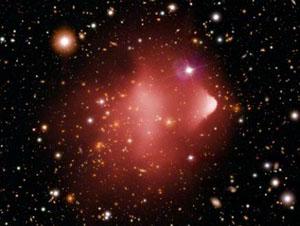Discovering dark matter
The Bullet Cluster, where NASA is searching for the presence of antimatter. (Image: NASA)
For decades scientists have understood that everything that we can see in the universe doesn’t add up to all the matter that must be there, based on our observations of how much gravity must be out there and the motions of the “visible” universe. At least 25 percent of the universe is composed of something called “dark matter.”
There could be a huge discovery on the order of finding dark matter — maybe one of the biggest cosmological mystery might be solved in our time.
Dr. Brian Greene, professor of Mathematics and Physics at Columbia University says we might be on the verge of discovering dark matter: “It’s a real possibility — there’s some interesting new data that is just coming to light — it could well point toward the discovery of dark matter. But it’s very tentative — great discoveries require fantastically convincing evidence. This could be the first step in that direction.”
Dr. Greene explains an experiment that is attempting to prove dark matter: “There’s one in particular — it’s a balloon-borne experiment floating over antarctica. And it is taking data … from the sky, and they’re seeing too many of a certain kind particle called electrons — too many, and they have to explain the source, and the source could be dark matter particles floating out there in space, colliding with one another — annihilating in a little burst — that gives rise to these particles that they’re seeing in the balloon. That’s one possible explanation.”
As for what dark matter is, Dr. Greene says: “When we look out into the sky with very powerful telescopes, we see the visible matter — stars and galaxies — moving, and the visible stuff is moving so quickly that it should all fly apart — much like water, if you picture water on a bicycle wheel as it’s spinning, the water flies off if the wheel spins too fast. That should be happening to the stars and galaxies, but it’s not; therefore, there must be something exerting more gravity than the stuff we can see. Stuff that exerts gravity but doesn’t give off light, therefore it’s dark: dark matter.
“And when you calculate how much should be out there … it should be about 25 percent of the mass of the universe.”
“The Takeaway” is PRI’s new national morning news program, delivering the news and analysis you need to catch up, start your day, and prepare for what’s ahead. The show is a co-production of WNYC and PRI, in editorial collaboration with the BBC, The New York Times Radio, and WGBH.
More at thetakeaway.org
